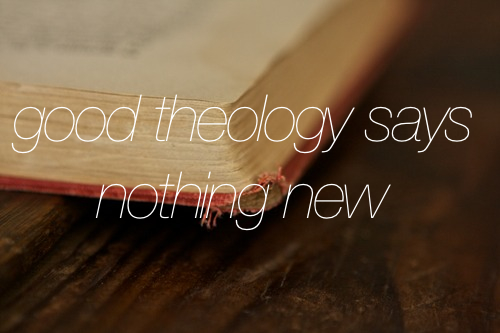 I love new things. When I got my new Macbook, their was a sense of excitement as I opened up the box and carefully removed the plastic over my shiny new piece of technology. Anytime an entrepreneur puts out a press release or makes a keynote announcing their innovations, I can’t help but be excited about the new possibilities. When an internet start-up launches a new social network, I am quickly intrigued. New is exciting. When brands, business, and individuals create, innovate, and push the boundaries, people get excited. Because innovation and creativity are exciting. We love new.
I love new things. When I got my new Macbook, their was a sense of excitement as I opened up the box and carefully removed the plastic over my shiny new piece of technology. Anytime an entrepreneur puts out a press release or makes a keynote announcing their innovations, I can’t help but be excited about the new possibilities. When an internet start-up launches a new social network, I am quickly intrigued. New is exciting. When brands, business, and individuals create, innovate, and push the boundaries, people get excited. Because innovation and creativity are exciting. We love new.
Unless we are talking about theology.
Good theology says nothing new.
Because while new is exciting for our smartphones. Good theology is not innovative, it simply says the things have been said for thousands of years. It might be said in new, exciting, and innovative ways, but the content of what is said is the same, unchanging truth.
Let me be very clear. Creativity, innovation, and pushing boundaries are important - even for theologians. But creativity, innovation, and pushing boundaries are important in the art that flows out of good theology not in the developing of the theology itself.
We need theologians that are creative, but we don’t need theologians that are creating new theologies. We need theologians that are pushing the envelope, but not in the understanding of scripture. Creativity should be spent crafting art that says something old in new and innovative ways.
“Everything that needs to be said has already been said. But since no one was listening, everything must be said again.” - Andre Gide
If you hear someone teaching the Bible claiming to have found a new way of understanding the Bible, run.
A good theology will always have been said before because good theology is rooted in an ancient truths of Scripture. It’s an old, ancient truth that has been taught in thousands of different ways, by thousands of different theologians, and in hundreds of languages. The scriptures are an ancient text that say today what they have always said. We may find new applications for our day and age, but they mean today what they always meant.
